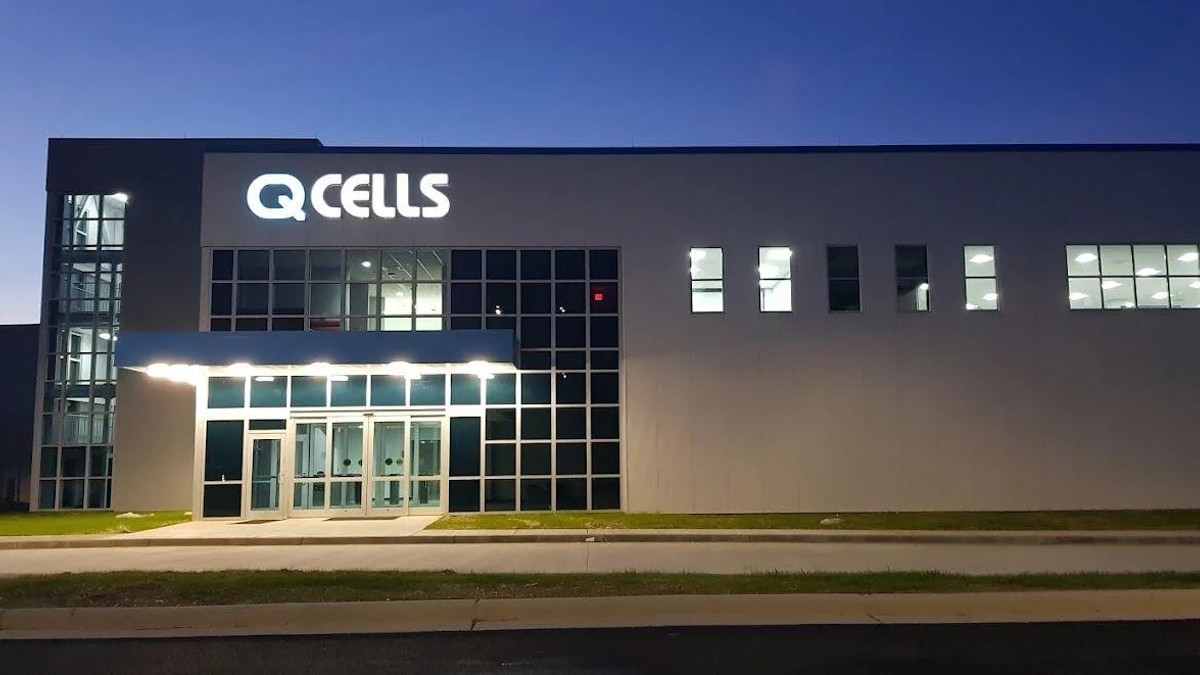Qcells will make 2.5M solar panels to fill largest US community solar order ever
PV solar-cell manufacturing giant Qcells and community solar firm Summit Ridge Energy are together going to deploy 1.2 gigawatts (GW) of community solar power.
This project between Qcells and Summit Ridge Energy is the latest in its three-year-long partnership.
Qcells will manufacture 2.5 million solar panels – what the White House says is the “largest community solar order in US history” – which will eventually generate enough clean electricity to power 140,000 homes and businesses across the US, including households in underserved communities. The White House announcement did not indicate what the target date is on this project, but we will update the story when we find out.
Community solar results in an average of 10% in annual savings for customers and is a way for renters and those without access to rooftop solar to benefit from clean energy.
US vice president Kamala Harris will officially mark the commitment between the two companies at a Qcells’ solar panel manufacturing site in Dalton, Georgia, today at 1:45 p.m. ET, which can be viewed live here.
In January 2023, Seoul-headquartered Qcells announced that it would invest more than $2.5 billion to build a solar supply chain in Georgia – the largest-ever investment in clean energy manufacturing in the US to date. Qcells CEO Justin Lee then credited Senator Jon Ossoff’s (D-GA) Solar Energy Manufacturing for America Act – which created tax credits for domestic manufacturing across the entire solar supply chain – for the reason it came to fruition:
We’ve worked closely with Senator Ossoff to get his solar manufacturing legislation signed into law, which helped make today’s historic investment possible. We look forward to continuing our close partnership with Senator Ossoff to create fully American-made and sustainable solar solutions, starting here in Georgia.
On March 23, Qcells announced an additional $147 million investment through its solar supplier, Hanwha Advanced Materials Georgia, to open a third factory in Georgia, and it will be the only plant in the US to produce solar ethyl vinyl acetate (EVA), the most commonly used encapsulant material. An encapsulant is used to provide adhesion between the PV module’s solar cells, the top surface, and the rear surface.
Qcells’ total solar panel production capacity in Georgia is expected to reach 8.4 GW by 2024.
Photo: Qcells
Read more: In a first, renewables beat coal in the US power sector in 2022
UnderstandSolar is a free service that links you to top-rated solar installers in your region for personalized solar estimates. Tesla now offers price matching, so it’s important to shop for the best quotes. Click here to learn more and get your quotes. — *ad.

PV solar-cell manufacturing giant Qcells and community solar firm Summit Ridge Energy are together going to deploy 1.2 gigawatts (GW) of community solar power.
This project between Qcells and Summit Ridge Energy is the latest in its three-year-long partnership.
Qcells will manufacture 2.5 million solar panels – what the White House says is the “largest community solar order in US history” – which will eventually generate enough clean electricity to power 140,000 homes and businesses across the US, including households in underserved communities. The White House announcement did not indicate what the target date is on this project, but we will update the story when we find out.
Community solar results in an average of 10% in annual savings for customers and is a way for renters and those without access to rooftop solar to benefit from clean energy.
US vice president Kamala Harris will officially mark the commitment between the two companies at a Qcells’ solar panel manufacturing site in Dalton, Georgia, today at 1:45 p.m. ET, which can be viewed live here.
In January 2023, Seoul-headquartered Qcells announced that it would invest more than $2.5 billion to build a solar supply chain in Georgia – the largest-ever investment in clean energy manufacturing in the US to date. Qcells CEO Justin Lee then credited Senator Jon Ossoff’s (D-GA) Solar Energy Manufacturing for America Act – which created tax credits for domestic manufacturing across the entire solar supply chain – for the reason it came to fruition:
We’ve worked closely with Senator Ossoff to get his solar manufacturing legislation signed into law, which helped make today’s historic investment possible. We look forward to continuing our close partnership with Senator Ossoff to create fully American-made and sustainable solar solutions, starting here in Georgia.
On March 23, Qcells announced an additional $147 million investment through its solar supplier, Hanwha Advanced Materials Georgia, to open a third factory in Georgia, and it will be the only plant in the US to produce solar ethyl vinyl acetate (EVA), the most commonly used encapsulant material. An encapsulant is used to provide adhesion between the PV module’s solar cells, the top surface, and the rear surface.
Qcells’ total solar panel production capacity in Georgia is expected to reach 8.4 GW by 2024.
Photo: Qcells
Read more: In a first, renewables beat coal in the US power sector in 2022
UnderstandSolar is a free service that links you to top-rated solar installers in your region for personalized solar estimates. Tesla now offers price matching, so it’s important to shop for the best quotes. Click here to learn more and get your quotes. — *ad.

